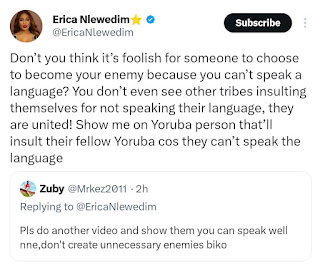Nigerian actress and reality TV personality Erica Nlewedim has sparked widespread conversation online after calling out critics who ridiculed her attempt to speak the Igbo language in a viral video.
The short clip, which made rounds on social media recently, captured the Big Brother Naija alum trying to converse in Igbo, her native language. What might have been a lighthearted or even encouraging moment quickly turned sour as critics flooded the internet with disparaging comments. While some viewers found the video amusing, others responded with mockery and outright insults. A significant portion of the backlash came from individuals within the Igbo community itself, igniting a larger cultural conversation.
Among the harsher criticisms were remarks questioning Erica’s identity, with some users going as far as calling her derogatory names. Others made fun of her fluency, using it as a metric to gauge her authenticity as an Igbo woman. What was once a casual moment became the center of a deeper issue regarding language, identity, and unity among the Igbo people.
Rather than remaining silent, Erica took to her social media platforms to confront the controversy. She expressed disappointment in what she described as the self-destructive tendencies within her ethnic group, specifically pointing to the judgmental responses from fellow Igbos. She highlighted how quick people were to shame rather than support, and challenged the community to reflect on its approach toward its own members.
“Look at my Igbo people in the comments showing how much they hate their own,” she wrote. “Continue but please don’t complain when others don’t show you love. You can’t be so openly divided against your own people and expect trust from outsiders.”
Her comments were both a defense of herself and a broader criticism of internalized bias. Erica questioned the logic behind vilifying someone over language skills, especially within a cultural context where many young Nigerians have grown up in urban environments or abroad, limiting their exposure to indigenous tongues.
One user had joked that she was “struggling” with her language skills, prompting a sharp response from Erica. “Don’t you think it’s foolish for someone to choose to become your enemy because you can’t speak a language?” she replied. “You don’t even see other tribes insulting themselves for not speaking their language. They are united!”
Her statements continued to resonate with supporters and critics alike. She went on to emphasize the need for compassion and solidarity among the Igbo people, particularly toward those who may not have had the privilege or opportunity to learn the language fluently.
“Is it your first instinct to insult someone who is from your tribe but can’t speak the language?” she asked. “And use words like pig, bitch, shame etc? Of course not! We on the other hand need to learn love and unity.”
While Erica’s message found strong backing from many who applauded her courage to speak up, not everyone agreed with her method of communication. Some observers felt she had crossed a line by comparing the Igbo community unfavorably to other ethnic groups in Nigeria. One user argued that she could have raised her point without pulling in comparisons, which they believed only served to stoke tribal sensitivities.
Despite the divide in public opinion, Erica’s remarks have triggered an important and long-overdue conversation around the role of language in cultural identity, as well as the harm that internal prejudice can cause. In a country as linguistically and culturally diverse as Nigeria, fluency in one’s native language is often viewed as a badge of authenticity. However, Erica’s experience highlights the generational and societal shifts that make this issue far more complex.
Her statements have opened a window for dialogue on what it truly means to belong to a culture. For many young Nigerians, especially those raised in urban or diasporic contexts, their identity is not always linked to linguistic proficiency. The actress's call for empathy and unity is now prompting wider discussions on how ethnic groups can support one another in reclaiming and embracing their roots, rather than tearing each other down.
As social media continues to buzz with varying perspectives, one thing remains clear. Erica’s viral video has become much more than a trending moment. It has become a mirror, reflecting the challenges of cultural pride, belonging, and self-love within the Nigerian context.

















![Content Creator Angelica Kelechi Speaks Out on Alleged Sexual Assault at Khloe Abiri’s Spa [VIDEO]](https://blogger.googleusercontent.com/img/b/R29vZ2xl/AVvXsEgQStip4cn2DAOvQ2hNFU30OAFWoxfQIDOnStd0uVgwwxKrFAQYYvtFni6QV04OGP8dyKk5TCAhXM5es9linl1ClhjPzaazz2tTt0LmJ5lFVe5202o2McF9QROT1v2hEyNTdY-M1KRuLTY6OqqysKNfcsY5bCtwCIP8wEQ4AXcfQfTaXWWZiixqf82NDH5a/w72-h72-p-k-no-nu/abiri-khloe123.jpg)






0 Comments
Hey there! We love hearing from you. Feel free to share your thoughts, ask questions, or add to the conversation. Just keep it respectful, relevant, and free from spam. Let’s keep this space welcoming for everyone. Thanks for being part of the discussion! 😊